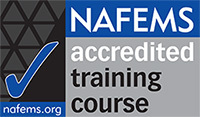Two-Session Online Training Course
2 hours per session
PDH Credits - 4
Attend the live sessions, or view the recordings at your convenience.
Not Available to Attend this Time?
Would you like us to notify you when the next course is open for enrollment? If so, add yourself to the eLearning Waitlist
Please click here to view the FAQ section, or if you need to contact NAFEMS about this course.
Engineering Board PDH Credits
*It is your individual responsibility to check whether these e-learning courses satisfy the criteria set-out by your state engineering board. NAFEMS does not guarantee that your individual board will accept these courses for PDH credit, but we believe that the courses comply with regulations in most US states (except Florida, North Carolina, Louisiana, and New York, where providors are required to be pre-approved)
Special Note(s):
Telephony surcharges may apply for attendees who are located outside of North America, South America and Europe. These surcharges are related to individuals who join the audio portion of the web-meeting by calling in to the provided toll/toll-free teleconferencing lines. We have made a VoIP option available so anyone attending the class can join using a headset (headphones) connected to the computer. There is no associated surcharge to utilize the VoIP option, and is actually encouraged to ensure NAFEMS is able to keep the e-Learning course fees as low as possible. Please send an email to the e-Learning coordinator (e-learning @ nafems.org ) to determine if these surcharges may apply to your specific case.
Just as with a live face-to-face training course, each registration only covers one person. If you plan to register a large group (10+), please send an email to e-learning @ nafems.org in advance for group discounts.
For NAFEMS cancellation and transfer policy, click here.






